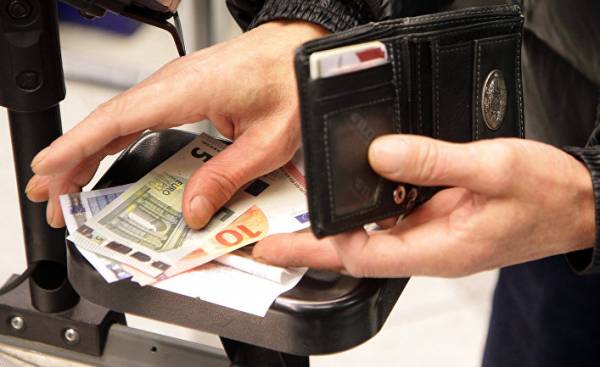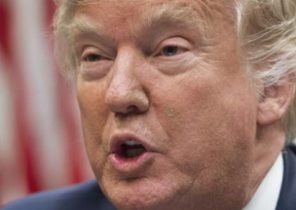
Recently I found myself in a quiet corridor of the Delft technical University in the Netherlands, opposite the vending machine. I had to speak at a conference called “Rethinking money”, but because after the flight very tired and suffered because of the time difference, wanted to drink Coca-Cola. From a vending machine was a small digital interface, created by Dutch company Payter. It sported the phrase, “contactless payment”. I pulled out my Bank card, but instead of dispensing of the beverage, the machine gave the message “Card is invalid”. Not all cards are the same, even if you managed to get one — and it’s not available to everyone.
In the view of the economist, an idealized free market is when rational people come together in monetary relationships for mutual benefit. One side — “buyer” — conveys the banknotes to the other party — the seller, and he provides in exchange for real goods or services. And here I was, tired man in search of opportunities to increase the level of blood sugar. And me shop in the form laid out on the shelf carbonated beverages, which is in charge of acting on behalf of the seller Cola vending machine. It is a docile, mechanical apparatus that must comply with the informal market contract: you give the money to my owner — I give you a coke. So why the damn machine does not want to sign this contract with me? There is a failure of the market mechanism.
To deal with this defect, you must first understand that in our life there are two types of funds. “Cash” is a system of physical Bank notes transmitted for transactions manually. They are in the public domain. We could call them “public money”. We treat cash as a public service, they are “just there”, and that’s enough. Like other utilities, they may seem ugly and unattractive, given the ineffectiveness and space for corruption, but access to them is in principle open. The richest members of society can transfer them directly to the poorest, and Vice versa.
Along with this, there is a separate system of electronic Fiat money, in which our Bank notes take the form of “data objects” recorded in the database Bank — official body vested with power of maintaining their account for us. We call this Bank account, and, instead of physically moving the money that is sent from a mobile phone or Internet messages to his Bank with a request to change data. The money will go away from you to another person, if the two corresponding Bank will agree on the corrections to your account, and then your performance will be reduced, and indicators of the second side will increase.
In fact, this second type is private and running on infrastructure that is collectively controlled by profit-hungry commercial banks and a number of cooperating private intermediaries of payment, such as VISA and MasterCard. Record of data on your Bank account are not public money. It would be correct to say that your Bank account records private promises of your Bank about the possibility of you getting access to public money. To have “500 pounds” in my Bank account, Barclays actually means that “Barclays promises you access to 500 pounds”. The ATM network is the main way of transformation of banking promises — “deposits” to the state funds. And the system of electronic payments, on the other hand, is a way to transfer or renew these promises between us.
This dual system allows you to pay for pizza at the restaurant by using both private digital money and cash extracted from an ATM in case of system failure of Bank cards. Such a choice seems fair. Depending on the circumstances, we may focus on the appropriateness of one or another form. However, as you read this, the architects of the “cashless society” hard at work on the elimination function of the use of public funds. They want to completely privatize the movement of banknotes, having to force banks and intermediaries, private payments in the centre of all relationships between buyers and sellers.
The society of non-cash payments — more accurately it should be called the society Bank payments — often presented as inevitable, the result of “natural progress”. The assertion is either naive or hypocritical. Any future society of non-cash Bank payments will be the result of a deliberate war against cash unleashed by the Union of the three elite groups having a deep interest in his appearance.
The first group is the banking sector, which controls the main system of electronic Fiat money — the competitor of the public system of cash. Representatives of the banking sector’s annoying that people do exercise their right to convert Bank deposits into public money. This causes them to support the ATM network in working condition. They believe a society of cashless payments utopia in which money will not be able to leave the banking system but also exist outside and will only move between banks.
The second group of private sector payments (MasterCard and others like him) who will receive the profit from the management infrastructure that supports the banking system, and optimize the process by which we move money between Bank accounts. They have their selfish reasons to insist on the cancellation of the option cash payments. Of cash transactions involve direct interaction between two parties, without any intermediaries, and do not leave Visa the opportunity to interrupt them.
The third group — perhaps ironically — consists of state and quasi-public entities such as Central banks. In conjunction with the financial services industry they are to monitor and control force everyone to buy into the attractiveness of companies for Bank payments. The system of banking money turnover forms the PANOPTICON, which allows — in theory — to capture, view and analyze all transactions, both good and bad. In addition, the “Autonomous” nature of cash means to remotely change or freeze them impossible. This prevents the implementation of the Central banks of the “innovative” monetary policies, such as setting negative interest rates, which slowly change the remote Bank deposits in order to coerce people into spending.
The government never mentioned the strategy of monetary policy. It’s not very clever. Perhaps, the main weapon used by the Alliance, is more than a classic scare tactic “shock and awe”. Criminals use cash! For cash to buy drugs! Cash is a black economy! Cash encourages tax evasion! The ability to present control as protection is based on constant appeals to think about the external enemy — the terrorist or mafia. This element of moral panic contrasted with friendly unobtrusive advertising digital payments. Emerging cashless payments society emerges like a futuristic sunrise washes away these dangerous dirty banknotes rays hygienic and convenient digital salvation.
In support of the core Alliance is an auxiliary body nomenclature of academics, economists and futurists, the living in the green suburbs and flying business class for presentations at technological conferences sycophantic media experts and innovative journalists glorifying the life without cash. The book “the Curse of cash” (2016) Harvard Economics Professor Kenneth Rogoff was nominated for the award “book of the year” by the Financial Times and McKinsey, which undoubtedly was accompanied by invitations to sponsored financial sector conference in five star hotels.
Psychological attack is working. Netherlands — where I was faced with a vending machine — become one of the key fronts in the war on cash. Perceived here as an illegal immigrant on the run “cash” are increasingly excluded from the formal economy, attracting disapproving glances sellers in stores. Everywhere you set “only accept”. What Cards are they? Well, just a glamorous socialite, a welcome in every store. The cards have the higher position. Look at Bank commercials and images of Card accessories. For cash no accessories does not.
Today, however, shifting the frontline in poorer countries. In India, for example, recently there was the so-called “demonetization” consisting of coarse and rapid withdrawal of all paper money by order of the Prime Minister Narendra modi, seeking to bring order to the “shadow economy”. This ritual inevitably resulted in difficulties among the poorest of India’s citizens, is dependent on cash and often do not have access to Bank accounts. The mission, originally aimed at the eradication of corruption, was ironically changed to the imposition of “life without cash” for economic development of poor people in India.
This mission received support created on the basis of the UN Alliance of “Better than cash”, which encourages “the transition from cash to electronic payments to reduce poverty and promote inclusive growth”, and key partners believes Visa, MasterCard and the Citi Foundation. The actions of modi was also preceded by the beginning of the program Cashless Catalyst, a joint initiative of the government of India and USAID, aims to spread in India e-payments and the support of many engaged in the implementation of digital payments companies. Such formal unions of States, corporations and scientific-pedagogical personnel is impressive. To justify this, admired the actions of modi from wealthy representatives of the urban elite of India can safely refer to the book Rogoff.
Rogoff, however, seemed frightened and said that advocated the elimination of cash only in developed countries with developed banking systems. Ugh, the curse! Highly influential and politically powerful economist Harvard releases dedicated to the fight against cash book on a world scale and is worried that less wealthy countries take it seriously. How so?
Attempt to imagine a society of non-cash Bank payments as a good for the disadvantaged is shaky at best. If you are vulnerable “occupant” of the informal sector of the economy, suspicious type out of the system or precariously employed person with low income, banks and payment intermediaries is unlikely to be interested in giving you priority. Society Bank payments will not process the actions that occur in the peripheral cracks that form the basis of your existence. In fact it is designed to eliminate these gaps. What could be described as “progress” and at the same time would mean separating from the economy in the process of economic cleansing. Under the pretext of destroying the “shadow economy”, the lower strata of society, homeless, eccentric and unruly citizens are forcibly driven under the control of the state-corporate mainstream.
Can’t say that had a special love for cash. I don’t care about nostalgic dreams about the aesthetic beauty of the banknotes, their structure and cultural value within the market system, although I understand that this is important for many. I don’t care about pedantic history of cash and which Chinese dynasties produced their first tan or sun. What bothers me is the involuntary callousness of the vending machine, which picked up and blocked my path to free trade.
Old machines didn’t do that. They had a little coin slot that gave the opportunity even oborvannaya the beggar to turn his tiny income in food. Fix your gaze on the machine. Actually devices two. Integrated in the unit enclosure Payter does not work for the seller of coke, and on payment of the Corporation. From the seller Cola Bank account alone, but the machine uses many people with many accounts in different banks. These banks must determine which of their clients wants to transfer the money: how much, on any account and in any other Bank. The device is designed to send information about my card on line network transmission of card payments, where for a small fee she will — in theory — the designated route to facilitate the transfer of funds from my account to the account of the seller.
It ceased to be a deal between me and the seller. I’m dealing with a number of unknown thirsting for the profit of third parties that stand between us, as organizers cash flow, and potential “gatekeepers”. If the gatekeeper does not want to be connected to business relations with me, and with seller to do business I can’t. They can suppress, control and condition this is a nice basic rituals of capitalism — the transfer of money for goods. This harmless device emits a mechanical indifference, reporting only to the distant invisible bosses, launching an invisible algorithms in the invisible black boxes that I don’t like.
Calling the payments a “non-cash” transactions in cash it would be fair to call “butbecause”. Because that’s what represent the physical banknotes, and the only thing standing between us and a fully privatized monetary system.
As with previous privatisations, we will hear experts debate that, if the company of electronic payments will cease to meet the requirements of people, they displace private systems better. Hell. When was the last time you saw a reliable competitor MasterCard, Visa and the like? They lead a vast network of networked systems that are subject to the relentless network effects. The store owners are not interested in using competitors Visa, given the absolutely dominant position of the latter.
The best that you can hope for is reasonable payment oligopoly corporations, greatly exposed to geopolitical aspirations of the States on whose territory they are located. The Chinese government has supported the establishment of China UnionPay because didn’t want the payment. USA were the gatekeepers in by the Chinese citizens transactions.
If the defense always has two options. You either block an incoming attack, or apply a strategic counterattack that sometimes described by the phrase “the best defense is a good offense”.
In terms of the first strategy is to demonstrate that the arguments against cash are exaggerated, incorrect, or flawed. In an angry tirades against cash present as an exaggeration, and inaccuracy, but crucial incompleteness. For example, suppose we agree that criminals prefer cash. Does this mean that they should be banned? The prohibition of all that prefer the criminals will almost certainly lead to a restricted, suffocating existence of everyone. Congratulations, we have outlived the crime, but did so at the expense of the free creative space and information protection from unauthorized access. The end of crime will be accompanied by the emergence of the power of the police state, who is always beside you, climbing in your personal life relevant to you as to kids who can’t be trusted. Enjoy life.
The second option involves an attack on the proposed alternative. Note that, firstly, a new society of non-cash payments actually will not solve old problems — crime goes digital, and instead of stealing the wallet will be hacked your account — and, worse, will cause a whole new set, which in marketing materials MasterCard was not mentioned. Let me read the writing in invisible ink: if we had Mentioned that due to the elimination of the possibility of cash transactions, we will be able to see everything you do? Do not be discouraged, because if you have nothing to hide, nothing to fear!
Oh Yes, I can also use scare tactics. I can say that the elimination of cash brings us one step closer to a potential understanding of the most powerful and automated set of state-corporate financial control in the world. Many either do not understand or they do not care. We, like the slowly boiling in the boiling frog, it seems, do not notice how to drive themselves at the mercy of aloof, inscrutable infrastructure that makes us more submissive to the invisible bureaucratic processes.
Maybe I should enhance the effect of the tactics of “shock and awe”? I might be able to argue about how a cashless society, the terrorists zeroed in on the outlet to slow down the entire regional economy?
No. My main remedy cash will be simple and intuitive. It is reliable to the same extent unattractive “cash”. It’s easy to use. It does not need any fancy infrastructure. It is not subject to arbitrary failures in the algorithms because of the incompetence of programmers. And, Yes, it leaves no traces of data that can be used to encourage aspirations and neuroses of faceless technocrats and business analysts in my daily life. Crime goes with it included, but it is good old normal capitalism, not capitalism predictive control for a “Special opinion”. And ask yourself this: do you really want to live in that society without the ability to buy drugs? Believe me, existential pain will have something to suppress.







